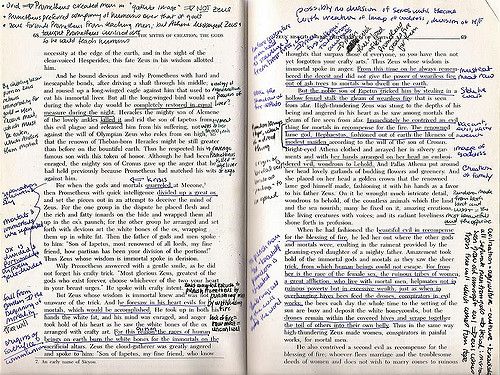How to Read to Remember - A Guide to Not Forgetting What You've Read
Mr. Hazel. The name invokes terror into every incoming freshman. They've all heard rumors about his insane demands and harsh grading.
The Bell rings: class has started. Mr. Hazel paces up and down the room, hunting for the kids with guilt on their eyes. He stops by your desk.
Uh oh.
A hand reaches down and grabs your book. His eyes slowly scan each page, making sure the margins are full of pencil marks.
"Is this a blank space I see?"
Your heart plummets. And so does your grade.
We all lived in fear of Mr. Hazel's obsession with marginalia. I thought note-taking while reading was a waste of time. Why do I have to stop and take all these stupid notes? Let me read! But to avoid his wrath, I did it anyway.
14 years later, which books do I remember from High School? From other classes, maybe a few titles. From Mr. Hazel's class? I remember the books we read. I remember the characters. I remember the plots. I remember the lessons and morals from every. single. book.
How to read

Marginalia by cat-sidh
Books are awesome. If you learn by reading, books are the best investment you can make, both in terms of time and money. The cost: anywhere from $9.99 to free-ninety-nine. The return: experience thousands of lives, learn the lessons of the past, avoid the mistakes others have made, and open your mind to new ways of thinking.
But how many times have you read a book, only to forget everything about it?
Let's fix that.
(This article is about reading books with the intention of learning. If you want to read a book for pleasure, do yourself a favor and ignore this article).
How to Make Time to Read
If learning and growing is important to you, you have time to read.
20 pages a day. That's all it takes.
At 250 pages a book you'll read at least 25 books a year. That's 2 to 5 times the average.
If 20 pages seems daunting read 10. Or 5. Or 1. Increase when that feels easy.
Bring a book with you everywhere. Read when you're eating alone, in line for something, need a mental break from work, upon waking, before sleeping.
If you say reading should be a priority for you, make it a priority.
Choosing What to Read
Hundreds of thousands of books are published each year. It feels like all of them have 4.5 stars on Amazon. We need a few filters.
Have a preference for older books
It's too easy to get caught up in hype for the 'hot new bestseller that changes everything!!!' Remember that time is great for filtering out the mediocre (see: the Lindy effect).
Your crotchety old uncle is convinced that his generation made the best music, and that today's music is garbage. What's really happening is this: Radio 104.5 'All Oldies All The Time' and your uncle have completely forgotten the mediocre songs, and only kept the best from two decades of music.
Despite our technological advances, humans don't change much. When looking for advice on how to live, or how to cooperate with others, or how to avoid cognitive biases, look to the ancients. If a book has survived for 1000 years, humanity must find it useful enough to continue re-translating and re-publishing it.
Find book suggestions from people you trust...
Some great booklists:
... or ask for them!
People are happy to recommend a book, especially if it's related to their field of expertise. Send a quick, polite email and you'll get a response most of the time.
Unsure of what to write? Here's a basic script you can copy-paste.
"Hello ,
Your work on [project] is very interesting. I would like to understand it better, but lack some knowledge about [topic]. Can you recommend a few books to someone new to this field?
Thank you,
You can always shoot me an email, and tell me something you're struggling with. I'll send you a book recommendation or two.
When studying a new field, read the 'classics' first
Not only are the classics often older, they form the foundational basis, the gestalt from which today's thought-leaders operate. If you want to understand the cutting edge, you have to understand the basics. More on that here.
There's a reason they're the classics.
Don't read 'tactical' books unless you need the information right now
In 5 years, what will be more useful: step-by-step instructions on improving your website's Google rank, or knowledge of the psychology behind persuasion? If you need page views right now, read the Google rank book. Otherwise read the psychology book.
Have a bias for books that teach: mental models, fundamentals, and/or philosophy.
Skim the Book and Read a Summary
You've picked a book. Now what?
Remember when your English teacher told you to never use 'Spark Notes'? Terrible advice.
Don't go into a book blind. You're here to learn, not to be surprised. Look through the table of contents. Skim the book to get an idea of the book's structure. Spoil the whole thing by reading someone else's notes, a summary, or the last chapter.
Places to find book summaries:
Before reading, you should have a map of the book's main ideas. This gives you a framework to attach new ideas and arguments to.
It's okay to quit a book
You've read through a book summary. Will you get anything more from reading the whole book? If the answer is no, don't read the book.
You've started reading the book but it's dragging on forever. If a book is boring, quit it.
Quitting books frees up time to read more useful books. You have zero obligation to finish a book.
Marginalia
It's time to take some notes. Make Mr. Hazel proud.
Carry a pencil with your book. I use these Kurutoga pencils because the lead never breaks. I don't like pens for marginalia but that's your call.
Everytime you read something interesting, underline it and then jot a thought in the margin. You have to write something down, even if it's just copying the line word-for-word. You don't have to be obsessive and fill every blank space in the margins, just jot down what you find interesting or useful.
On Highlighting
Highlighting without note taking isn't effective. When I go to the grocery store, I have to write out a shopping list. When I don't, I always forget an item or two. But if I write a shopping list, everything on that list ends up in my shopping cart, even if I left the list at home. The act of writing solidified the information in my head.
Highlighting is great if you need to look at the source again, and quickly find important information. But it doesn't help you remember.
To write something down, you have to actively recall some information. This activity tells your brain that something important is going on, and you'll be more likely to remember it.
Some questions to ask while note-taking
- Where can you apply this idea to your own life?
- Do you agree with the author?
- Can you think of an example relating to this?
You've written a note. Mark the page with a sticky flag or dog-ear it for access later.
At the end of every chapter, summarize the chapter in your own thoughts. Just a few sentences will do.
Wait a Week
You've finished a book. Pat yourself on the back and set a reminder for next week. Shelve it and let the ideas stew in your brain for a bit. We're incorporating a bit of spaced repetition to help us remember more.
Synthestize Your Notes
It's a week later. Your calendar is telling you it's time to copy down your book notes. Open a text editor and get typing.
You can either flip through the whole book or just hop between your marked pages. A lot of passages you marked as interesting will seem trite or obvious. Skip those. Everything else that's still interesting, type it up.
If an idea spans multiple paragraphs, try to distill it down to a sentence or two.
Reformat your notes into actionable items.
Now, summarize the whole book in a short paragraph.
Congratulations! You've got a beautiful set of book notes.
How often do you look at your book notes?
Should you go back and look at your book notes? Should you not? How often?
What about Kindle users?


Kindles are awesome. If you're on-the-go, you get access to thousands of books in a format that weighs less than a paperback. You can still follow this guide no problem.
One nice thing about Kindles is the ability to export your notes and quickly make a document. I use Bookcision to clean up the exported notes.
When given the option, I still prefer physical books. Note-taking is easier, and I remember more. The physical book turns into a memory palace of sorts. If I want to look up a passage from a physical book, I have a general idea of how far in the it is, and even if it's on the right or left side. I can flip to the section relatively quickly. If I left in post-it flags, even quicker.
Pass It On
You just read a book, and put a lot of work in to make sure you understand and remember the ideas.
- If the book was amazing, recommend it to others.
- If the book sucked, tell people by rating it on Amazon or Goodreads.
- Post your notes online for others to utilize.
- Go out and use those ideas to better the world around you! Knowledge is worth nothing if you don't apply it.
Summing it all up
- Choose the right books.
- Skim the book and read a summary of the main ideas.
- Don't be afraid to quit a book.
- Read, and take notes as you go. Summarize each chapter.
- Set the book aside for a week.
- Collect your notes into a document.
- Pass it on.
What's your process for reading books? Did I miss a useful technique? I want to know! Email me: james@jamesstuber.com
Check out all of my book notes
Want to level up your productivity and start getting work done?
We built an interactive coach, available 24⁄7 to give you a feasible next step to improve your productivity skills.




Member discussion